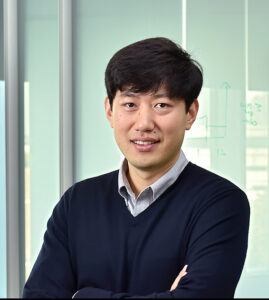Posted on August 7, 2023 in ASRC News, Nanoscience Initiative

ASRC Nanoscience Initiative professor Xi Chen has received a prestigious National Science Foundation Early Career Award—one of the agency’s most competitive grants. The five-year, $538,547 in funding will support Chen and his research team’s work to advance the field of hygroscience—an emerging area of research that seeks to harness the power of water evaporation for energy generation and ensuring sufficient water supplies, among other promising applications.

“I’m really interested in understanding how plants harness energy from water evaporation and convert it into forces or locomotion that drive their essential tasks,” said Chen of his work. “Once we better understand these mechanisms, we can apply those principles to developing efficient, low-cost and low-impact methods for renewable energy generation, water supply, locomotion, and green chemistry,” he added.
Chen’s work is inspired by the hygroscopic properties that exist in trees, which have the ability to store water when the local environment is dry and release it when the environment is humid. This property is opposite to the way most materials react to dry and humid conditions, but that counter-intuitive ability allows trees to survive drought and other extreme weather conditions. One of Chen’s team’s goals is to develop a new class of hygroscopic materials that autonomously collect water from dry air and then release it into water-capture containers without the use of electrical energy.
“Professor Chen’s work offers an exciting approach to addressing some of our urgent environmental and resource needs, and it’s exemplary of the kind of cutting-edge, out-of-the-box scientific research that the ASRC was designed to facilitate,” said Rein Ulijn, founding director of the ASRC Nanoscience Initiative.
“As a public higher education institution, we’re thrilled that Professor Chen’s grant will also support his team’s creation of hands-on educational materials and opportunities for K-12 students—especially those from communities that are underrepresented in STEM—to learn about and test the principles of hygroscience,” said Joshua Brumberg, ASRC interim executive director and CUNY Graduate Center dean for the sciences. “These kinds of opportunities are critical to diversifying STEM and creating the future talent that will advance emerging areas of science.”
